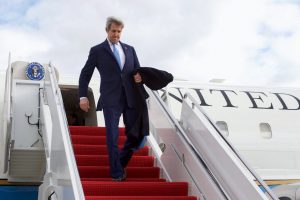John Kerry, the U.S. special envoy for climate issues, was in Tianjin this week to discuss climate change and emissions reductions. It was the second stop of a broader Northeast Asia tour. Kerry started his trip in Japan and moved on to South Korea after departing China on September 3 local time.
In China, “Secretary Kerry emphasized the importance of the world taking serious climate actions in this critical decade and strengthening global climate ambition ahead of COP26 in Glasgow, Scotland,” a State Department spokesperson said.
There were no big announcements or new commitments made during Kerry’s time in Tianjin, nor even a joint statement like the one that accompanied Kerry’s first trip to China in April. He tried to remain upbeat, though, in a summary of the China leg of his trip. “We made some progress. That’s the bottom line,” Kerry, speaking from Seoul, told reporters. “In diplomacy, you don’t always get everything you want in one fell swoop.”
Kerry’s main interlocutor was his direct counterpart, Xie Zhenhua, China’s own special envoy for climate, but far more attention was given to his talks with higher-ups. Kerry also met with Foreign Minister Wang Yi, Vice Premier (and Politburo Standing Committee member) Han Zheng, and Yang Jiechi, the director of the Office of the Foreign Affairs Commission, via videolink.
Each of these conversations repeated similar themes, with Kerry trying to keep the focus on the urgent climate crisis, and his Chinese counterparts speaking more broadly about the issues in China-U.S. relations
In his meeting with Yang, Kerry reportedly “underscored the importance of U.S.-China cooperation to reduce global emissions and raise global climate ambition.” Likewise, according to a State Department spokesperson, Kerry told Han that “there is no way for the world to solve the climate crisis without the full engagement and commitment of the PRC, which produces 27 percent of global emissions. Without significant reduction efforts by the PRC, we cannot meet the goal to limit warming to 1.5 degrees Celsius.”
Han’s message, however, was a bit different, based on a Chinese government readout. “Addressing climate change is an important part of China-US cooperation, which must be based on trust,” the readout summarized Han as saying. “…[I]t is hoped that the United States will create a good atmosphere for bilateral cooperation on climate change”
Wang notably, spent most of his remarks haranguing the U.S. for the dismal state of China-U.S. relations overall. He ended his remarks, according to the Chinese Foreign Ministry’s official read-out, with a warning:
China-U.S. cooperation on climate change not only serves the interests of both sides, but also benefits all mankind, which enjoys broad prospects for development. The U.S. side wants the climate change cooperation to be an “oasis” of China-U.S. relations. However, if the oasis is all surrounded by deserts, then sooner or later, the “oasis” will be desertified. China-U.S. cooperation on climate change cannot be divorced from the overall situation of China-U.S. relations. The United States should work with China to meet each other halfway and take positive actions to bring China-U.S. relations back on track.
Kerry, meanwhile, stuck to his wheelhouse. In his talks with Wang, “Secretary Kerry affirmed that the United States remains committed to cooperating with the world to tackle the climate crisis, which must be addressed with the seriousness and urgency that it demands, and encouraged the PRC to take additional steps to reduce emissions,” the State Department spokesperson said.
Overall, Kerry tried to push back against the notion that China-U.S. cooperation on climate change is constrained by the current tensions in the relationship. “My response to them was, look, climate is not ideological, not partisan, and not a geostrategic weapon,” Kerry told reporters.
Indeed, all the bombast from Chinese officials leaves out one crucial point. China has pressing reasons of its own to address climate change: to prevent a climate emergency and the harsh reality that would bring for the Chinese people. The deadly floods in Henan province earlier this summer are just the latest example of the consequences. In addition, Beijing has seized on the opportunity to position China as a global leader in one of the most important future industries: clean energy.
Climate change is not an issue where the United States is trying to cajole China into doing something for Washington’s benefit – as in the case, say, of cooperating with the U.S. on North Korea issues. Instead, taking quick and meaningful action on climate change is in the best interests of both the United States and China, even if the other side does nothing.
In other words, the main impetus for China to act on climate change is domestic, not diplomatic. As Kerry noted, “President Xi has been driving the climate agenda in China” – that will remain true, regardless of U.S. diplomacy.
Or, as State Department spokesperson Ned Price put it, “[W]e know we don’t have a choice: There has to be some degree of cooperation on this existential threat. We are the world’s two largest polluters.”
































